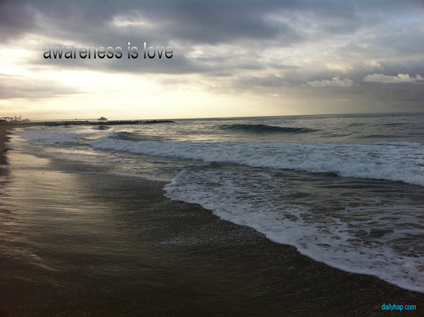A discussion of awareness, reality, and love
by Jordan Myska Allen, a lover of life and entrepreneur. He acts as a psychological, spiritual, and professional consultant and practices applied integral thinking.
“Awareness is love.”
Someone said this to me the other day and it struck me on a guttural level. I am sure I had heard it before, but that day it really stuck with me. Awareness is love. I cannot really explain more than that, but I know that it is a valuable phrase because as I have shared it seems to be useful to others as well.
Certainly you could argue this point philosophically, but then what are you aware of and what are you missing? Who are you? Are you aware of your desire to argue? Are you aware of your desire to be right? Are you aware of your desire to be seen, to disprove, to agree or disagree? Are these things making you happy or getting you what you want? Are you aware of what you want, and if not how can you love it? How can you pursue it? Are you aware of the loving awareness in which the self arises or…?
Can you love all these different aspects of your self in the moment? Try it on. Consider that awareness is love, and see what changes in your life.
I think the equation hit me because I have a habit of rejecting the parts of myself that do not fit with my self image. The sad, the angry, the jealous, the hurt, the unseen, the fearful, the shameful, and guilty feelings arise all the time in me, but I do not like them so I push them away. I am often so good at pushing these feelings away that I have not even been aware of them before they are gone—unconscious inside, or projected out onto someone (or something) else. Anyone else notice this pattern in yourself?
By bringing awareness to both these rejected feelings, and to the desire to reject them, I love them. I love myself in all of my imperfection. I get to be the love that holds these feelings instead of exclusively identified as them. As soon as I get caught up in doing something to get rid of the feelings—generally to atone for some supposed past wrong I have committed, or to attain some ideal future I imagine—I am no longer loving them as they are. But as soon as I become aware of this “getting caught up,” I get to accept and love that as well, and I am loving the moment.
This is not a happiness strategy. It is a strategy of fully engaging the present moment instead of pushing it away. It is a relationship to welcoming all experience, good and bad, a commitment to embrace life in all of its complexity. Seeing awareness as love means I love all of those parts of myself, those unhappy parts equally with the happy ones. I experience them all more fully.
It is a paradox. But it is worth it.

